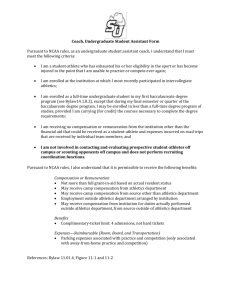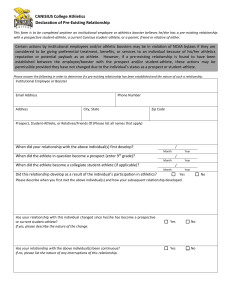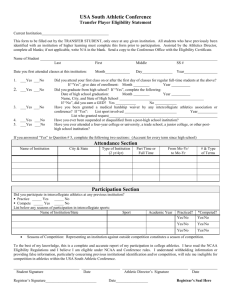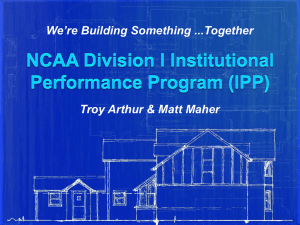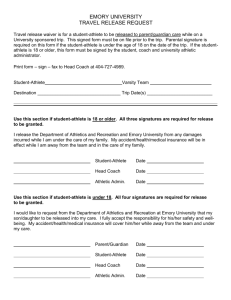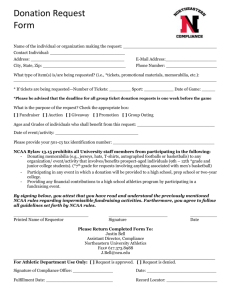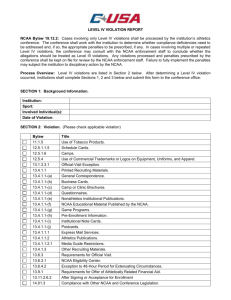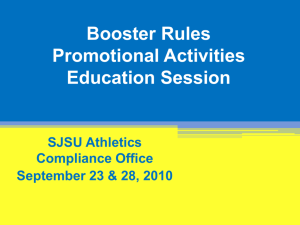know the rules extra benefits financial aid employment game tickets
advertisement
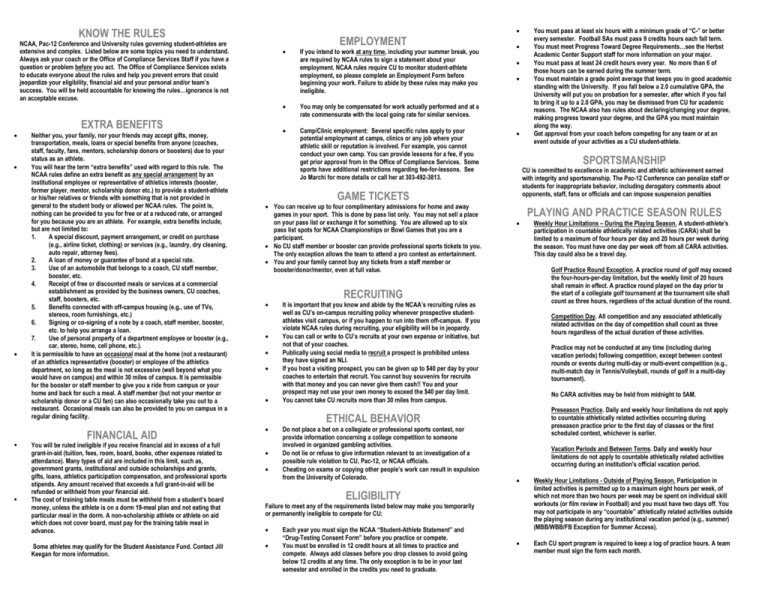
KNOW THE RULES NCAA, Pac-12 Conference and University rules governing student-athletes are extensive and complex. Listed below are some topics you need to understand. Always ask your coach or the Office of Compliance Services Staff if you have a question or problem before you act. The Office of Compliance Services exists to educate everyone about the rules and help you prevent errors that could jeopardize your eligibility, financial aid and your personal and/or team’s success. You will be held accountable for knowing the rules…ignorance is not an acceptable excuse. EXTRA BENEFITS Neither you, your family, nor your friends may accept gifts, money, transportation, meals, loans or special benefits from anyone (coaches, staff, faculty, fans, mentors, scholarship donors or boosters) due to your status as an athlete. You will hear the term “extra benefits” used with regard to this rule. The NCAA rules define an extra benefit as any special arrangement by an institutional employee or representative of athletics interests (booster, former player, mentor, scholarship donor etc.) to provide a student-athlete or his/her relatives or friends with something that is not provided in general to the student body or allowed per NCAA rules. The point is, nothing can be provided to you for free or at a reduced rate, or arranged for you because you are an athlete. For example, extra benefits include, but are not limited to: 1. A special discount, payment arrangement, or credit on purchase (e.g., airline ticket, clothing) or services (e.g., laundry, dry cleaning, auto repair, attorney fees). 2. A loan of money or guarantee of bond at a special rate. 3. Use of an automobile that belongs to a coach, CU staff member, booster, etc. 4. Receipt of free or discounted meals or services at a commercial establishment as provided by the business owners, CU coaches, staff, boosters, etc. 5. Benefits connected with off-campus housing (e.g., use of TVs, stereos, room furnishings, etc.) 6. Signing or co-signing of a note by a coach, staff member, booster, etc. to help you arrange a loan. 7. Use of personal property of a department employee or booster (e.g., car, stereo, home, cell phone, etc.). It is permissible to have an occasional meal at the home (not a restaurant) of an athletics representative (booster) or employee of the athletics department, so long as the meal is not excessive (well beyond what you would have on campus) and within 30 miles of campus. It is permissible for the booster or staff member to give you a ride from campus or your home and back for such a meal. A staff member (but not your mentor or scholarship donor or a CU fan) can also occasionally take you out to a restaurant. Occasional meals can also be provided to you on campus in a regular dining facility. FINANCIAL AID You will be ruled ineligible if you receive financial aid in excess of a full grant-in-aid (tuition, fees, room, board, books, other expenses related to attendance). Many types of aid are included in this limit, such as, government grants, institutional and outside scholarships and grants, gifts, loans, athletics participation compensation, and professional sports stipends. Any amount received that exceeds a full grant-in-aid will be refunded or withheld from your financial aid. The cost of training table meals must be withheld from a student’s board money, unless the athlete is on a dorm 19-meal plan and not eating that particular meal in the dorm. A non-scholarship athlete or athlete on aid which does not cover board, must pay for the training table meal in advance. Some athletes may qualify for the Student Assistance Fund. Contact Jill Keegan for more information. EMPLOYMENT If you intend to work at any time, including your summer break, you are required by NCAA rules to sign a statement about your employment. NCAA rules require CU to monitor student-athlete employment, so please complete an Employment Form before beginning your work. Failure to abide by these rules may make you ineligible. You may only be compensated for work actually performed and at a rate commensurate with the local going rate for similar services. Camp/Clinic employment: Several specific rules apply to your potential employment at camps, clinics or any job where your athletic skill or reputation is involved. For example, you cannot conduct your own camp. You can provide lessons for a fee, if you get prior approval from in the Office of Compliance Services. Some sports have additional restrictions regarding fee-for-lessons. See Jo Marchi for more details or call her at 303-492-3813. SPORTSMANSHIP CU is committed to excellence in academic and athletic achievement earned with integrity and sportsmanship. The Pac-12 Conference can penalize staff or students for inappropriate behavior, including derogatory comments about opponents, staff, fans or officials and can impose suspension penalties GAME TICKETS You can receive up to four complimentary admissions for home and away games in your sport. This is done by pass list only. You may not sell a place on your pass list or exchange it for something. You are allowed up to six pass list spots for NCAA Championships or Bowl Games that you are a participant. No CU staff member or booster can provide professional sports tickets to you. The only exception allows the team to attend a pro contest as entertainment. You and your family cannot buy any tickets from a staff member or booster/donor/mentor, even at full value. RECRUITING Practice may not be conducted at any time (including during vacation periods) following competition, except between contest rounds or events during multi-day or multi-event competition (e.g., multi-match day in Tennis/Volleyball, rounds of golf in a multi-day tournament). No CARA activities may be held from midnight to 5AM. Preseason Practice. Daily and weekly hour limitations do not apply to countable athletically related activities occurring during preseason practice prior to the first day of classes or the first scheduled contest, whichever is earlier. ETHICAL BEHAVIOR Vacation Periods and Between Terms. Daily and weekly hour limitations do not apply to countable athletically related activities occurring during an institution's official vacation period. Weekly Hour Limitations - Outside of Playing Season. Participation in limited activities is permitted up to a maximum eight hours per week, of which not more than two hours per week may be spent on individual skill workouts (or film review in Football) and you must have two days off. You may not participate in any “countable” athletically related activities outside the playing season during any institutional vacation period (e.g., summer) (MBB/WBB/FB Exception for Summer Access). Each CU sport program is required to keep a log of practice hours. A team member must sign the form each month. ELIGIBILITY Each year you must sign the NCAA “Student-Athlete Statement” and “Drug-Testing Consent Form” before you practice or compete. You must be enrolled in 12 credit hours at all times to practice and compete. Always add classes before you drop classes to avoid going below 12 credits at any time. The only exception is to be in your last semester and enrolled in the credits you need to graduate. Weekly Hour Limitations – During the Playing Season. A student-athlete's participation in countable athletically related activities (CARA) shall be limited to a maximum of four hours per day and 20 hours per week during the season. You must have one day per week off from all CARA activities. This day could also be a travel day. Competition Day. All competition and any associated athletically related activities on the day of competition shall count as three hours regardless of the actual duration of these activities. Failure to meet any of the requirements listed below may make you temporarily or permanently ineligible to compete for CU: PLAYING AND PRACTICE SEASON RULES Golf Practice Round Exception. A practice round of golf may exceed the four-hours-per-day limitation, but the weekly limit of 20 hours shall remain in effect. A practice round played on the day prior to the start of a collegiate golf tournament at the tournament site shall count as three hours, regardless of the actual duration of the round. It is important that you know and abide by the NCAA’s recruiting rules as well as CU’s on-campus recruiting policy whenever prospective studentathletes visit campus, or if you happen to run into them off-campus. If you violate NCAA rules during recruiting, your eligibility will be in jeopardy. You can call or write to CU’s recruits at your own expense or initiative, but not that of your coaches. Publically using social media to recruit a prospect is prohibited unless they have signed an NLI. If you host a visiting prospect, you can be given up to $40 per day by your coaches to entertain that recruit. You cannot buy souvenirs for recruits with that money and you can never give them cash!! You and your prospect may not use your own money to exceed the $40 per day limit. You cannot take CU recruits more than 30 miles from campus. Do not place a bet on a collegiate or professional sports contest, nor provide information concerning a college competition to someone involved in organized gambling activities. Do not lie or refuse to give information relevant to an investigation of a possible rule violation to CU, Pac-12, or NCAA officials. Cheating on exams or copying other people’s work can result in expulsion from the University of Colorado. You must pass at least six hours with a minimum grade of “C-” or better every semester. Football SAs must pass 9 credits hours each fall term. You must meet Progress Toward Degree Requirements…see the Herbst Academic Center Support staff for more information on your major. You must pass at least 24 credit hours every year. No more than 6 of those hours can be earned during the summer term. You must maintain a grade point average that keeps you in good academic standing with the University. If you fall below a 2.0 cumulative GPA, the University will put you on probation for a semester, after which if you fail to bring it up to a 2.0 GPA, you may be dismissed from CU for academic reasons. The NCAA also has rules about declaring/changing your degree, making progress toward your degree, and the GPA you must maintain along the way. Get approval from your coach before competing for any team or at an event outside of your activities as a CU student-athlete. PROMOTIONAL AND CHARITABLE ACTIVITIES The NCAA restricts the promotional activities of student-athletes. You cannot endorse, directly or indirectly, any commercial product or service. Any use of your name, picture or appearance to support CU, a charitable, educational or non-profit activity requires prior written approval from the Athletic Director. You cannot miss class for such an activity. You may accept legitimate and normal expenses from CU, the Pac-12 or the charitable, educational or non-profit agency related to participation in such activity. An authorized representative of the charitable, educational or non-profit agency must sign a release statement ensuring that your name, image or appearance is used in a manner consistent with NCAA rules. You may not permit use of your name or picture in a “name the player” contest conducted by a commercial business for the purpose of promoting the business. If you are involved in an institutional promotion on a television or radio network, you are precluded from making a reference to the local station or network as part of the promotion (e.g., "Watch the Buffs on ESPN"). NCAA rules say that the apparel you wear during competition, as well as in pre- and post-game activities, including press conferences, may have only one manufacturer’s logo or trademark per article of clothing and that logo/trademark must not exceed 2.25 square inches in size. AMATEURISM Do not sign a contract, accept any benefit from, or even orally agree to be represented now or in the future by someone acting as an agent or financial advisor. “Payment” can be anything – money, preferential treatment, services, etc. An Agent is anyone trying to market or earn a financial gain from a SA’s athletic ability. Reach out to the Professional Sports Counseling Panel if you would like more assistance as you approach the conclusion of your eligibility. You may not tryout with a professional sports team during the school year. You may not receive preferential treatment because of your reputation, skill or payback potential as a professional athlete. MEDICAL EXPENSES These are medical expense benefits incidental to a student's participation in intercollegiate athletics that may be financed by the institution: Athletics medical insurance; Death and dismemberment insurance for travel connected with intercollegiate athletics competition and practice; Drug-rehabilitation expenses; Counseling expenses related to the treatment of eating disorders; Special individual expenses resulting from a permanent disability that precludes further athletics participation; Glasses, contact lenses or protective eye wear (e.g., goggles) for studentathletes who require visual correction in order to participate in intercollegiate athletics; Medical examinations at any time for enrolled student-athletes; Expenses for medical treatment (including transportation and other related costs) incurred by a student-athlete as a result of an athletically related injury. Such expenses may include the cost of traveling to the location of medical treatment or the provision of actual and necessary living expenses for the student-athlete to be treated at a site on or off the campus during the summer months while the student-athlete is not actually attending classes. Medical documentation shall be available to support the necessity of the treatment at the location in question; Surgical expenses to a student-athlete (including a partial qualifier or a nonqualifier) who is injured during the academic year while participating in voluntary physical activities that will prepare the student-athlete for competition; Medication and physical therapy utilized by a student-athlete during the academic year to enable the individual to participate in intercollegiate athletics, regardless of whether the injury or illness is the result of intercollegiate competition or practice; Medication and physical therapy utilized by a student-athlete (even if the student-athlete is not a full-time student) during the academic year to enable the individual to participate in intercollegiate athletics, only if the studentathlete resides on campus (or in the local community of the institution) and appropriate medical documentation is available to establish that the studentathlete is unable to attend the institution as a full-time student as a result of the student-athlete’s injury or illness; Medical expenses (including rehabilitation and physical therapy expenses) for a student-athlete who sustains an injury while participating in voluntary conditioning activities during the summer that are conducted by an institution's strength and conditioning coach with department-wide duties; and Preseason dental examinations conducted in conjunction with a regular preseason physical examination. CU Student Athletes If a medical expense does not fit into one of the categories previously listed, CU may approve those expenses on a case-by-case basis. VEHICLE AND HOUSING REGISTRATION If you own or operate a motor vehicle, you must complete the CU Vehicle Registration Form. This is a one-time requirement (unless you get a new vehicle) during your career at CU. You must also register your housing arrangement – you cannot receive free or reduced rent housing from a CU athletics representative (e.g., a scholarship donor or mentor). NEWS FOR STUDENT-ATHLETES Peruse the CU website—“Compliance Corner” for occasional updates http://www.cubuffs.com/compliancecorner Follow us via social media Know The Rules Call or come by the Office of Compliance Services: Twitter: @BuffsCompliance Facebook: Colorado Buffaloes Compliance Jill Keegan– Director of Compliance 303-492-6155, jill.keegan@colorado.edu Jo Marchi – Associate Director of Compliance, Monitoring 303-492-3813, marchi@colorado.edu Kevin Prochaska – Associate Director of Compliance 303-492-7823, kevin.prochaska@colorado.edu University of Colorado Champions Center, 4th Floor UCB 3 7 2 Boulder, CO 80309 Fax: 303-492-3364
